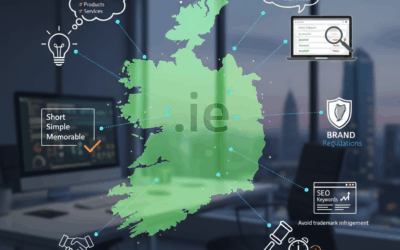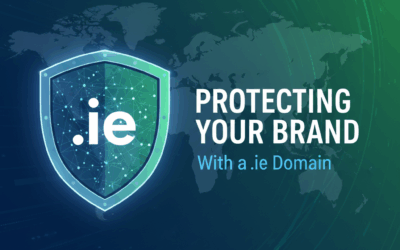.com or .org, .ie domains come with strict rules, local credibility, and real advantages for Irish businesses.This complete guide covers everything you need to know about .ie domains in 2025 — from their history and technical function to who should use them and how they boost trust, SEO, and brand protection.
Whether you’re launching a new business, rebranding, or considering switching from a .com, you’ll discover why a .ie domain might be the smartest move for your Irish online presence.
How Domain Systems Work
To understand what makes .ie special, let’s start with the basics: how domains work.
Every website lives on a server with a unique numerical address called an IP address (like 192.168.1.1). But memorizing numbers isn’t practical — that’s where domain names come in.
The Domain Name System (DNS) acts like the internet’s phone book. When you type a web address into your browser, DNS translates the domain name into the correct IP address so you can access the site.
Domain extensions — like .com, .org, or .ie — are known as top-level domains (TLDs). They appear at the end of a web address and help categorize the site.
TLDs fall into two main types:
- Generic TLDs (gTLDs): Used globally (e.g., .com, .net, .info)
- Country-code TLDs (ccTLDs): Reserved for specific countries (e.g., .ie for Ireland, .uk for the UK, .de for Germany)
.ie is Ireland’s official ccTLD — and it’s more than just a label. It’s a mark of authenticity.
History and Significance of .ie Domains
Ireland received its .ie domain extension in 1988, making it one of the earliest country-code domains on the internet.
Managed by the IE Domain Registry (IEDR), the .ie namespace has always prioritized integrity over convenience. From day one, only those with a genuine connection to Ireland could register a .ie domain.
This wasn’t arbitrary bureaucracy — it was a strategic decision to ensure the domain remained trusted, credible, and meaningful.
Verification Requirements
To register a .ie domain, you must prove your Irish connection. Acceptable documentation includes:
- Irish business registration number (CRO/RBN)
- Irish VAT number
- Irish passport or driving licence (with Irish address)
- Bank statement from an Irish financial institution
- Evidence of trading with Ireland (for non-residents)
This verification process ensures that every .ie website represents a real person or organization with ties to Ireland.
Why This Matters
When Irish users see a .ie domain, they know it’s not a fly-by-night operation. It signals legitimacy. That trust is hard to build — but .ie gives it to you from day one.
Over the years, the system has evolved with digital document uploads and faster processing, but the core principle remains unchanged: .ie is for those with authentic Irish ties.
Why Choose a .ie Domain Over Other TLDs?
While .com domains are global, .ie domains are local, trusted, and targeted. Here’s why they outperform generic options for Irish-focused businesses.
1. Local Trust and Credibility
Irish consumers are more likely to trust websites that feel local. A .ie domain immediately communicates that your business is based in Ireland or serves Irish customers.
Unlike .com sites — which could be run from anywhere — a .ie domain tells visitors: “We’re here. We’re real. We get you.”
Studies show users are more likely to click, engage, and convert on websites with local domain extensions.
2. Better Local Search Performance
Search engines like Google use domain extensions as a geographical signal. If someone in Limerick searches for “plumber near me,” a site with a .ie domain gets a natural ranking boost over a .com alternative.
This doesn’t guarantee top placement, but it gives you a competitive edge in local SEO — especially when combined with other optimization efforts.
3. Brand Protection and Uniqueness
The strict eligibility rules mean fewer people can register similar .ie domains. This reduces the risk of cybersquatting and brand confusion.
If you register yourbusiness.ie, competitors can’t easily register yourbusiness2.ie unless they also meet the verification requirements.
It’s a powerful way to protect your brand identity in the Irish market.
4. Professional Image for Irish Businesses
Using a .ie domain shows commitment to the Irish market. It positions your business as professional, established, and customer-focused.
Many Irish businesses still use .com domains thinking they appear “more international,” but this can backfire — especially when targeting local clients who value community and connection.
5. Less Competition for Good Names
Because .ie requires proof of Irish connection, there’s far less domain squatting and speculation than with .com.
This means you’re much more likely to secure a short, brandable, and relevant domain name — like cafedublin.ie instead of cafedublin123.com.
6. Supporting the Local Digital Economy
Revenue from .ie domain registrations supports digital initiatives in Ireland. The IE Domain Registry invests in cybersecurity, digital literacy, and internet infrastructure projects across the country.
Choosing .ie isn’t just good for your business — it helps strengthen Ireland’s digital future.
7. Premium Positioning
Like .ch for Switzerland or .de for Germany, .ie signals authenticity and quality to local audiences.
It tells customers you’re not just passing through — you’re invested in Ireland.
8. Future-Proofing Your Brand
As more businesses recognize the value of local domains, .ie addresses are becoming increasingly valuable.
Securing your brand’s .ie domain now protects your identity as the Irish digital economy grows.
Who Should Consider a .ie Domain?
While not every business needs a .ie domain, these types of organizations benefit most:
- Irish-based businesses targeting local customers (e.g., shops, tradespeople, restaurants)
- Professional services like accountants, solicitors, architects, and consultants
- E-commerce stores selling to Irish consumers
- Non-profits and community groups with Irish operations
- Freelancers and sole traders building a local client base
- International companies with Irish offices or customers
Ask yourself: Does my business gain value from being seen as genuinely Irish? If yes, a .ie domain is a strategic asset.
What to Know Before Registering a .ie Domain
The .ie registration process is more involved than buying a .com — but that’s what makes it valuable.
Documentation Requirements
You’ll need to provide proof of Irish connection. What you submit depends on your status:
- Irish businesses: CRO/RBN number, VAT number, or tax clearance certificate
- Individuals: Irish passport, driving licence, or bank statement with Irish address
- Non-residents trading with Ireland: Sales invoices, letters from accountants, or legal documents showing Irish business activity
Processing Time
After registration, you have 27 days to submit documents. The IE Registry typically reviews applications within 1–3 business days.
Once approved, your domain goes live at the next DNS zone reload (every odd hour).
Cost and Renewal
.ie domains cost more than generic TLDs — usually between €20–€40/year depending on the registrar.
Renewal requires maintaining your Irish connection. If you lose eligibility (e.g., close your Irish business), you may not be able to renew.
Internationalised Domain Names (IDNs)
.ie supports Irish language characters with fadas (á, é, í, ó, ú). You can register domains like seomra.ie or café.ie using IDN technology.
This helps preserve linguistic identity and makes it easier for Irish-language brands to establish an online presence.
Making the Right Domain Choice for Your Business
Choosing a domain extension is a long-term decision. For Irish businesses, the choice often comes down to:
- .ie: Best for local trust, SEO, and credibility
- .com: Ideal for global reach or international-first strategies
Many successful Irish businesses use both:
- Main website:
yourcompany.ie - Redirect:
yourcompany.com→yourcompany.ie
This protects the brand internationally while maximizing local impact.
Is the Extra Effort Worth It?
Yes — because the verification process is what creates value. That exclusivity builds trust, improves search visibility, and sets you apart from generic websites.
For most Irish businesses, a .ie domain isn’t just a web address — it’s a statement of identity.




0 Comments